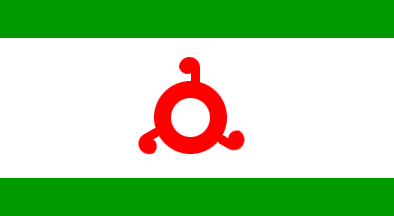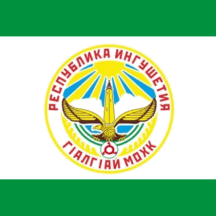 image by António Martins, 04 October 2006
image by António Martins, 04 October 2006 
Last modified: 2021-12-31 by valentin poposki
Keywords: ingushetia |
Links: FOTW homepage |
search |
disclaimer and copyright |
write us |
mirrors
 image by António Martins, 04 October 2006
image by António Martins, 04 October 2006
(Note: You need an Unicode-aware software and font to correctly view the Cyrillic text on this page. See here transliteration details).
The Ingush
were one of the Caucasian Muslim peoples brought together in the Mountain ASSR
of 1920. Four years later a separate Ingush region was established, and this in
turn merged with Chechnya in 1924. In 1992 (?) the Ingush separated from the
breakaway Chechen state — a wise move in view of
the subsequent invasion by Russia of the latter.
Stuart Notholt
Before it was Chechen-Ingush ASSR, later, from
December, 14, 1991 till December, 10, 1993 — named Ingush Republic.
Mikhail Revnivtsev, 02 October 2005
The author of the original version of this
flag is Khusen Barakhoiev (Хусен
Барахоев | Qusen
Baraqoev).
Mikhail Revnivtsev, 02 October 2005
A new Law dated 11 July 1999,
available
online (in Russian), changed the proportions
of the flag, established by the Law of 13 May 1994 as 1:2, to 2:3.
Antonio Gutiérrez, 25 June 2006
Descriptions of the solar sign are different in the
1994 and 1999 laws.
Antonio Gutiérrez, 30 June 2006
Recently I received a document from the
Parliament of the Republic of
Ingushetia what seems to be the official annex to the Law of 11 July
1999. The image of the flag in the annex has nothing to do with the
previous one, and fits more accurately (although
not entirely) with the description and measures prescribed in article 1 of
the Law and also with the images of actual flags. As far as I know this is
the one and only annex to the Law, so no construction sheet is
available, at least as annex to the Law.
Antonio Gutiérrez, 02 October 2006
The details of Article One are as follows:
The Law does not specify an overall size for the emblem, which in turn would give us a reasonable idea of the angle at which the beams join the circle and/or the amount showing.The National flag of the Republic of Ingushetia is a rectangular white panel, in the centre of which is a solar sign in the form of a red circle with three arched beams coming from the latter. The ratio of the flag’s width to its length is 1:2.
There are two green stripes — along the whole length of the upper and lower parts of the flag. Each of them is 1/6 of the total width of the flag. The radius of the inner circle of the solar sign is 1/6 of the flag’s width. Each of the three beams of the solar sign is a semicircle, the inner radius of which is 1/8 of the flag’s width. The width of the stripe, making a circumference of the solar sign and that of the beams, is 1/36 of the flag’s width.
The beams are located evenly along the circumference of the solar sign and directed anticlockwise.
Source of image above:
https://bakdar.org/v-ingushetii-otmechayut-pervyj-yubilej-flaga-glavy-respubliki/
Tomislav Šipek, 10 December 2019
The “wheel” inside that flag is a sun symbol.
It is red, truly red.
Ralf Stelter, 27 June 1999
The 1999 law text mentions
«красного
круга»
(red disc), not using the well-known words
"пурпурный",
"тёмне
красный" or
"чеверлёный",
which stand for dark red and are used in the legal description of the
flags of Moscow city,
Chuvashia and not many others.
António Martins, 28 June 2006
The flag of Ingushetia has been a real problem with regard to the
wonderful variety of official specs on offer, although the new lot seem to
answer a lot of questions with regard to how it should look now.
Christopher Southworth, 30 June 2006
To make things more complicated, the book Winds of change
[r4f96] gives two different descriptions
[of the pre-1999 flag], the one of the Law and
another Description signed by President of the Republic of Ingushetia
on 22 June 1994. [See image from this
book.]
Moreover, on vex-bulletin Informace (VexiINFO) No. 1,
dated 6 April 1994 [vei94a] are given
construction details for the solar sign, whose specs doesn’t fit
with any of the prescribed in the said documents.
More complications. The Law of 1994 appears in the 1999 Law as abolished,
numbered 1-RKZ and dated 13 May 1994. According to
this on line
document, Law is made up of 8 articles. At
Heraldica.RU website
there is another text, this numbered 36 and dated 15 July 1994, with 9
articles (this text is the one transcribed in
[r4f96]). Obviously are different texts
(?).
Finally, according to Gaceta de Banderas No. 9 (1993, page 44)
[gdb], quoting Flaggenmitteilung
[fml], the flag was adopted 7 April 1993.
All this give the following resumed timeline for the 1993-1994 period:
From [British TV station] BBC4’s “The World”, a report
from the Russian republic of Ingushetia, which included an interview with the
Ingush President, with the flag behind
him, and a shot of the flag flying
as taken from Ingush television and which was included in the BBC report. The
problem is that the two flags weren’t identical (and the flag on
ingushetia.ru is different again): the
“arms” on the central motif are different thicknesses
and different shapes: On the first scene, the red hoop is thicker, and the
three “arms” are chunky, not very curved and
“facing” the hoist; on the second the “arms”
appear to be almost straight with a “knob” at the end.
André Coutanche, 21 May 2004 and 03 Oct 2005
Perhaps some actual (and recent) photos may help:
Reference to the Ingush government
website confuses things further: The flag
at the top of the page is thin and lean but two small photos seem to show
the chunkier version
André Coutanche, 21 May 2004
We must conclude that there are different de facto versions
of the Ingush flag — and these de facto versions are actually used
officially.
André Coutanche, 03 Oct 2005
 image by Tomislav Šipek, 10 December 2019
image by Tomislav Šipek, 10 December 2019
Source of image above:
https://bakdar.org/v-ingushetii-otmechayut-pervyj-yubilej-flaga-glavy-respubliki/
Tomislav Šipek, 10 December 2019